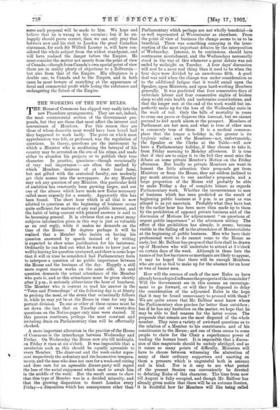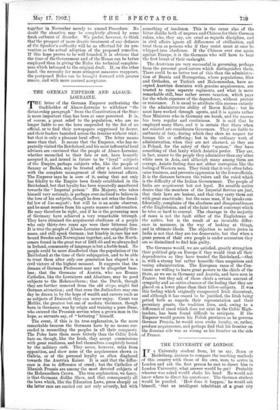Pliill WORKING OF THE YEW RULES.
THE House of Commons has slipped very easily into the new Procedure arrangements. They are not, indeed, the most controversial section of the Government pro- posals, but they are those that most affect the interest and convenience of Members. For this reason they are those of whose demerits most would have been heard had they happened to work badly. The point on which most apprehension was felt, or professed, was the regulation of questions. In theory, questions are the instrument by which a Minister who is meditating the betrayal of his country may be arrested on the eve of his crime, and made either to abandon his projects or to publish their true character. In practice, questions—though occasionally of very real importance — are often the method by which Members desirous of at least local fame, but not gifted with the oratorical faculty, can modestly get their names into the newspapers. As any Member may ask any question of any Minister, this particular field of ambition has constantly been growing larger, and not one of the abuses which have made new Rules necessary called more urgently for a remedy. Apparently this has been found. The short hour which is all that is now allotted to .questions at the beginning of business seems quite sufficient for matters of any real public interest, and the habit of being content with printed answers is said to be becoming general. It is obvious that on a great many subjects information given in this way is just as valuable as an oral reply, while it makes no demands on the time of the House. By degrees perhaps it will be realised that a Member who insists on having his question answered by speech instead of by writing is expected to show some justification for his insistence. Ordinarily he can find out what he wants to know just as well by leaving his question unstirred, and there is some hope that it will in time be considered bad Parliamentary form to interpose a question of no public importance between the House and the business of the day. Happily a still more cogent reason works on the same side. An oral question demands the actual attendance of the Member who puts it, and as this attendance must be given shortly after 2 p.m., it seriously abbreviates the hour of luncheon. The Member who is content to read his answer in the "Votes and Proceedings" of the following day is at liberty to prolong the meal, or the siesta that occasionally follows it, while he may yet be at the House in time for any im- portant division. To one or other of these causes must be set down the fact that on Tuesday out of twenty-five questions on the Notice-paper only nine were starred. If this process continues, perhaps the most constant and irritating drain on Parliamentary time will be effectually checked.
A more important alteration in the practice of the House of Commons is the interchange between Wednesday and Friday. On Wednesday the House now sits till midnight, on Friday it rises at six o'clock. It was impossible that a revolution such as this should be equally agreeable to 'every Member. The diner-out and the week-ender repre- sent respectively the sedentary and the locomotive temperar ments, and the man who does not care for a week-end outing and does care for an agreeable dinner-party will regret the loss of the social enjoyment which used to await him in the middle of the week. But the result seems to show that this type of Member was in a decided minority, and that the growing disposition to desert London every Friday—a disposition which has consequences other than Parliamentary which perhaps are not wholly benefiCial—is as well represented at Westminster as elsewhere. Prom the point of view of business the change seems to us to be beneficial. There was something annoying in the inter- ruption of the most important debates by the interposition of Wednesday. Interest, to be continuous, should have continuous nourishment, and the Wednesdays necessarily stood in the way of this whenever a great debate was not ended by midnight on Tuesday. A four days' discussion will now be a more real thing than it used to be when the four days were divided by an unwelcome fifth. A good. deal was said when the change was under consideration as to the additional fatigue that it would entail upon the Speaker, upon Ministers, and upon hard-working Members generally. It was predicted that four consecutive days of unbroken labour and four consecutive nights of broken sleep would ruin health and undermine constitutions, and that the longer rest at the end of the week would but im- perfectly make up for the loss of the Wednesday oasis in the week of toil. Only the bills of mortality in years to come can prove or disprove this forecast, but we cannot pretend to feel much alarm at the prospect. Members of Parliament are but men, and what is true of other men is commonly true of them. It is a medical common- place that the longer a holiday is, the greater is its hygienic value ; and the Members—not, unfortunately, the Speaker or the Clerks at the Table—will now have a Parliamentary holiday, if they choose to take it, from Friday morning to Monday afternoon. It is true that if they are to enjoy it to the full they must miss the debate on some private Member's Motion on the Friday afternoon. But loudly as private Members are wont to lament the little attention their proposals get from Ministers or from the House, they are seldom inclined to pay much attention to one another's proposals; and a large proportion of the House will probably be able to make Friday a day of complete leisure as regards Parliamentary work. Whether the inconvenience to men of business which has been predicted as the result of beginning public business at 3 p.m. is as great as was alleged is as yet uncertain. Probably what they have lost by the earlier hour has been more than made up to them by the prohibition of opposed private business and of the discussion of Motions for adjournment " on questions of urgent public importance " at the afternoon sitting. The effect of this prohibition has already, it seems, become visible in the falling off in the attendance of Mmisterialists at the beginning of public business. Men who have their professional work to do cannot come to the House so early, but Mr. Balfour has proposed that lists shall be drawn up of Members who will undertake to attend at 3 o'clock on certain days of the week. Although in these lists the names of but few barristers or merchants are likely to appear, it may be hoped that there will be enough Members who are not so tied to make up for the absence for an hour or two of busier men.
How will the success of such of the new Rules as have already been adopted influence the prospects of the remainder? Will the Government see in this success an encourage- ment to go forward, or will they be disposed to delay the consideration of the adjourned Rules in the hope that it may be found unnecessary to proceed with them? We are quite aware that Mr. Balfour must know where the Parliamentary shoe pinches far better than outsiders ; but if he has any hesitation on the matter, we hope that he may be able to find reasons for the latter course. The proposals that remain are the most disputed of the whole number. They raise a variety of awkward questions as to the relation of a Member to his constituents, and of his constituents to the House ; and one of them seems to some people to claim for the Chair a superhuman power of reading the human heart. It is impossible that a discus- sion of this magnitude should be unduly abridged, and as it raises so many points of difficulty, Ministers will have to choose between witnessing the abstention of many of their ordinary supporters and exerting on them a pressure which is ungrateful both in amount and in kind. Nor is it easy to see what period of the present Session can conveniently be doveted to debating Rules of this character. The time frOm now till August is fully occupied, and though Mr. Balfour has already given notice that there will be an autumn Session, it is doubtful how far Members will like being called together in November merely to amend Procedure. No doubt the situation may be completely altered by some fresh outburst of disorder. We prefer, however, to think that the prospect of more drastic treatment of any defiance of the Speaker's authority will he as effectual for its pre- vention as the actual adoption of the proposed remedies. If this hope proves to be well founded, it is obvious that the time of the Government and of the House can be better employed than in giving the Rules the technical complete- ness which belonged to the original draft. If, on the other hand, the necessity for more stringent measures reappears, the postponed Rules can he brought forward with greater reason, and with more assured acceptance.







































 Previous page
Previous page